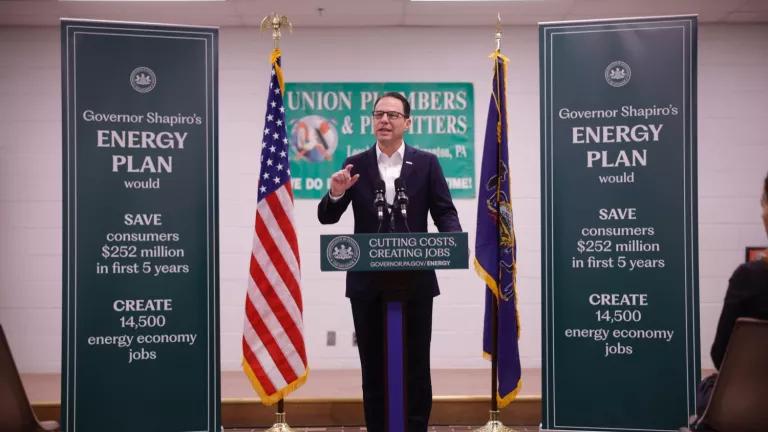Alberta's Climate Leadership Plan is a strong step forward in addressing province's emissions
Premier Rachel Notley unveiled a broad plan for addressing the Alberta's growing carbon emissions today, signaling a dramatic turn for a province that had long been an obstacle for Canada's climate commitments. The Climate Leadership Plan, which imposes limits on emissions from tar sands production, accelerates the transition from coal to clean energy, and establishes an economy-wide tax on carbon pollution, is a strong step forward for Alberta on climate and sets the stage for Canada to move forward with bold climate action in Paris. By setting limits on tar sands emissions, Alberta is marking an end to the era of unfettered expansion of the tar sands and is a promising first step for the province's economic transition to a strong, diversified economy sustained by clean energy sources.
Here are some of the plans major components:
- Emissions cap on tar sands production. The Government of Alberta is setting a 100 million metric ton limit on emission from the tar sands sector. This cap on emissions limits tar sands production to existing tar sands projects and those currently in construction without additional upstream emissions reductions by industry. Additional work will be needed to ensure that tar sands related infrastructure proposals that are inconsistent with this policy are abandoned, that the impacts on tar sands extraction on the Boreal forest and First Nations are addressed, and that Alberta continues to move toward a low carbon economy. However, this measure represents an end to the uncontrolled expansion of the tar sands and is an important step forward for both Alberta and Canada.
- Coal phase out by 2030. Alberta will phase out all carbon pollution from its coal sector and transition to cleaner energy sources by 2030. Importantly, Alberta will provide strong incentives for clean energy to ensure that at least two thirds of coal-generated electricity will be replaced by renewables. This coal phase out will ensure that renewable energy sources - primarily wind power - will comprise up to 30 percent of Alberta's electricity production by 2030.
- Economy wide carbon pricing. Alberta is moving forward with an economy wide carbon price of $30 per ton. Proceeds from this tax will be used to support measures that will reduce carbon pollution - such as clean energy research and technology, green infrastructure, and efficiency - as well as an adjustment fund to support individuals, facility, small businesses and First Nations.
- Methane reductions. The Government of Alberta also announced a 45% reduction of methane emissions in its oil and gas sector by 2025 - a goal that is as ambitious as that proposed by U.S. Environmental Protection Agency.
In its comments to its Climate Change Advisory Panel, NRDC noted that by adopting a strong climate policy, Alberta had the opportunity to lead Canada in a new direction on climate, opening the door for true provincial collaboration in meeting the greenhouse gas emission and climate challenges facing the nation. With the support of the Albertan people behind it, Premier Notley's government has succeeded in meeting that challenge and ahead of the Paris climate negotiations has established a strong example for high carbon jurisdictions to shift toward a lower carbon future. Alberta's Climate Leadership Plan cannot be the end of the province's efforts to address its carbon emissions, but it is a strong start.




